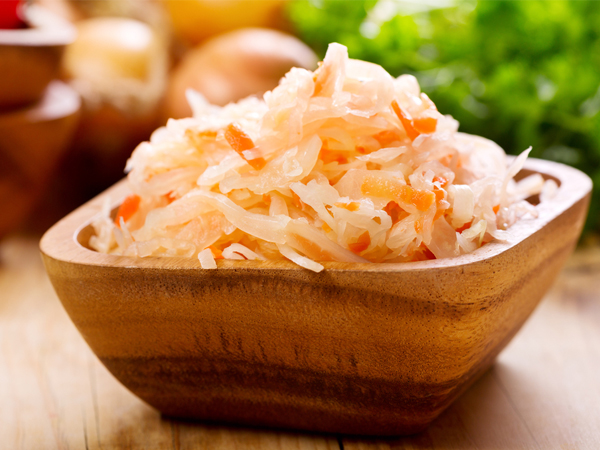
Health Benefits Of Sauerkraut
1. Prevents atopic dermatitis
Fermented foods have positive effects on the prevention and management of atopic dermatitis. A study has shown that a high intake (>92 times/month) of fermented foods such as sauerkraut is linked to the lower prevalence of atopic dermatitis. To mention, atopic dermatitis is a long-lasting skin condition characterised by red and itchy skin. [3]
2. May prevent asthma
Fermented vegetables have many biological compounds such as vitamin C, minerals, dietary fibre and beta-carotene along with phytochemicals and lactic acid bacteria. Some strains of lactic acid bacteria (Lactobacillus rhamnosus) found in fermented foods are known to possess strong immune-enhancing effects against diverse allergic diseases, including asthma. Therefore, sauerkraut, being a fermented food, may help in the prevention or management of asthma. [4]
 Why People With Asthma Are At Increased Risk Of Flu
Why People With Asthma Are At Increased Risk Of Flu
3. Reduces risk of diabetes
The presence of fatty acids, alcohol and lactic acids in fermented foods have health-promoting potentials. It may help in the management or prevention of metabolic disorders such as diabetes. The antidiabetic property of sauerkraut is mainly due to the antioxidant activities of these acids. [5]
4. Manages high blood pressure
Firstly, the low sodium content in sauerkraut is associated with a lower incidence of hypertension. Secondly, the bioactive compounds in sauerkraut possess potent antioxidative and anti-atherosclerotic effects which may help lower the cholesterol levels and manage high blood pressure. Also, vitamin K in this food item helps support heart health.

5. Supports digestive and gut system
The excess of probiotics and prebiotic fibre in sauerkraut may help improve digestive health and prevent related conditions such as diarrhoea and constipation. It may also help create a healthy and balanced gut microbiome which may help support the overall gastrointestinal health.
6. Good for mental health
Fermented foods like sauerkraut are enriched with fermentation chemicals such as bioactive peptides, lactoferrin and flavonoids which are known to improve the intestinal microbiota. As we know, good gut health is directly related to positive mental health, consumption of this phytochemical-rich food can help improve the mental health conditions such as anxiety and depression through the gut-brain axis. [6]
 Twin Pregnancy: How It Is Conceived, Factors That Increase The Chances, And Complications
Twin Pregnancy: How It Is Conceived, Factors That Increase The Chances, And Complications
7. Supports bone health
Sauerkraut contains a good amount of menaquinone or vitamin K2, one of the three forms of vitamin K found especially in fermented food items. This nutrient is associated with improved bone health and may help prevent bone-related diseases such as osteoporosis and weak bones. Also, calcium in food helps make the bone strong. [7]
8. Improves cognitive functions
Microorganisms in sauerkraut play a vital role in improving the cognitive functions, memory power and productivity of humans. Though cognitive decline increases with age, fermented foods like sauerkraut may help delay the process and help improve the neuropsychological status of a person. [8]

9. May help lose weight
Sauerkraut is very low in calories and high in nutrition and dietary fibre. The fibre helps provides satiety and keep a person fuller for longer while the low calories naturally reduce the intake of calories in a day and this helps lose weight easily. Also, high nutrients in the foods help maintain good health during the weight loss journey.
READ RELATED: Study finds a low risk of respiratory virus transmission on trains and buses across the US
10. Boost immunity
As aforementioned in many health benefits of sauerkraut, the food contains microorganism and vital nutrients such as vitamin C that helps boost immunity by improving the gut health and triggers the production of natural antibodies.
 15 Effective Weight Loss Tips For People With Diabetes
15 Effective Weight Loss Tips For People With Diabetes
11. Have chemopreventive agents
Genistein (a type of isoflavones) and high concentration of phytoestrogens in sauerkraut may help prevent the risk of certain cancer types such as breast, prostate and stomach. These compounds block cell growth, cell mutations and prevent the excessive cell growth which may proceed to cancer development. [9]

Side Effects Of Sauerkraut
- Sauerkraut contains around 500 mg/kg of histamine which may cause symptoms related to histamine intolerance such as the runny nose, facial swelling, itchiness and red eyes. [8]
- An abundance of tyramine, an amino acid in sauerkraut can sometimes cause high blood pressure when consumed in high amount by individuals who already have the condition.
- Some studies link the consumption of sauerkraut with the risk of laryngeal cancer. [9]
 Blackberries, Onions, Red Wine: Flavonoid-Rich Foods To Combat Flu And Common Cold
Blackberries, Onions, Red Wine: Flavonoid-Rich Foods To Combat Flu And Common Cold
How To Enjoy Sauerkraut
Sauerkraut is more like a less-salted pickle with packed nutrition, mild taste, sweet flavour and flowery aroma. It also has a pleasant tart taste, unlike other fermented foods.
To enjoy sauerkraut, one can either use it as a side dish with meals, or use it as a sandwich layer or garnish for salads.
How To Make Sauerkraut At Home
- Chop fresh cabbage (around two pounds) into thin pieces.
- In a bowl, mix cabbage with two teaspoons of salt.
- You will see the release of water. Add seasoning spices (optional) such as carrots and garlic.
- After 5-10 minutes, transfer the mixture into a covered glass container.
- For the next 24 hours, continue pressing the cabbage down so that it releases more liquid. You can add more water and salt to the mixture until the cabbage is not fully covered by the liquid.
- Leave the jar at a room temperature for around one to four weeks.
- Once fermented, it is ready to be served. You can then store it in the fridge.
 Amazing Health Benefits Of Sea Moss, Side Effects And How To Consume
Amazing Health Benefits Of Sea Moss, Side Effects And How To Consume
Common FAQs
1. What is the difference between kimchi and sauerkraut?
Both kimchi and sauerkraut are made by fermenting cabbage. However, while preparing the prior, more salt is added that makes it taste more pungent and less acidic. In latter, less salt is added which is why it is tarter. Also, in kimchi, a number of seasonings such as ginger and red pepper are added while sauerkraut is simple and made only from salt, cabbage and water.
2. Is it OK to eat sauerkraut every day?
Consumption of sauerkraut in a small amount every day helps with boosting the immune system, improving digestive health, preventing metabolic disorders like diabetes and overall body functions. However, it is also rich in harmful compounds like tyramine which may cause hypertension and histamine intolerance.
3. Is sauerkraut anti-inflammatory?
Yes, sauerkraut is rich in probiotics and prebiotics which is known for anti-inflammatory properties. They help reduce inflammatory cytokines in the body and prevent related diseases such as arthritis.
Source:








